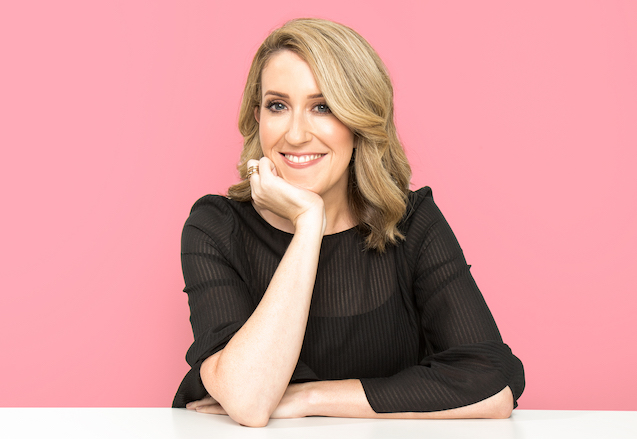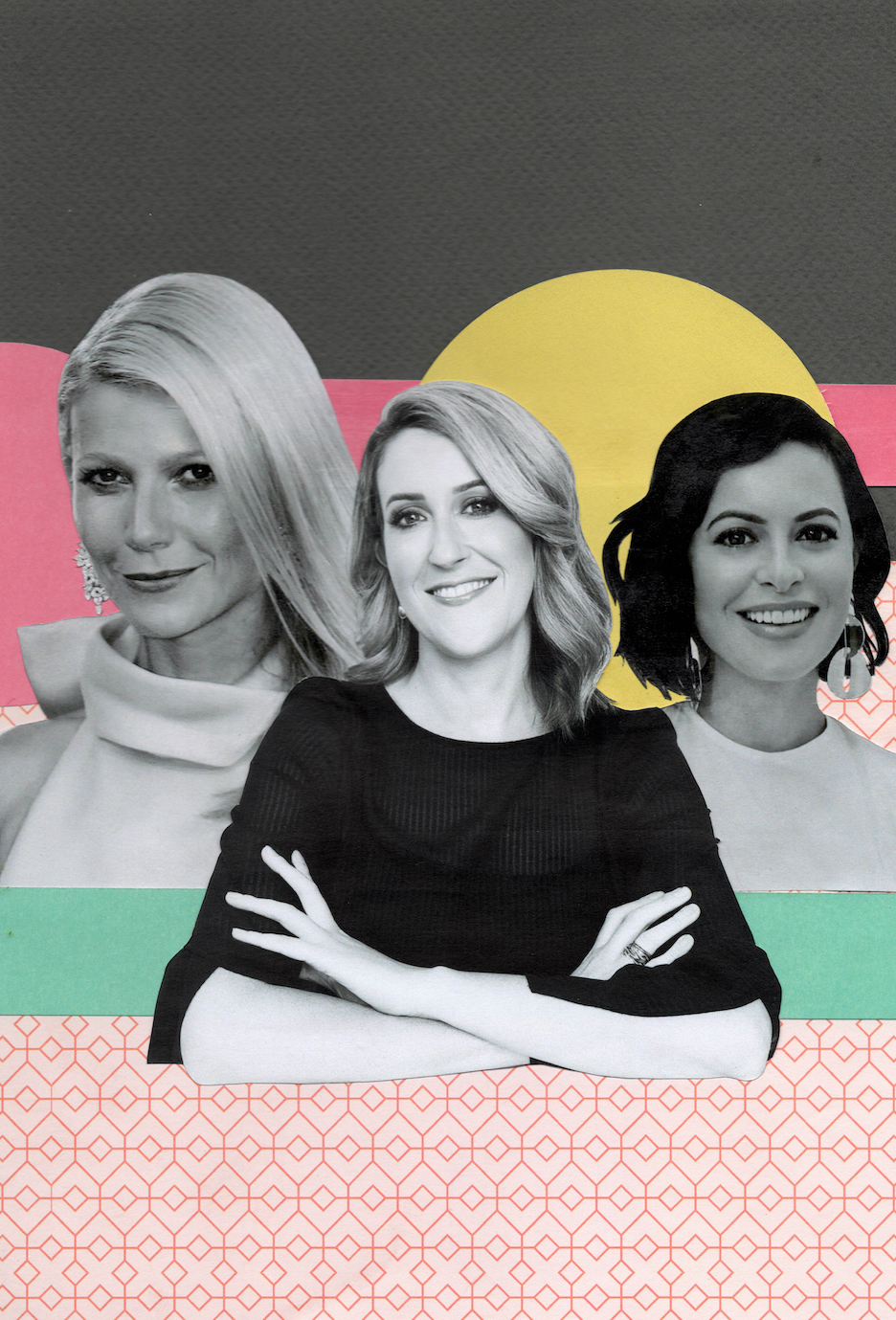For proof that female entrepreneurs are the new rock stars, you need only attend a Business Chicks 9-To-Thrive networking event – or watch one of their videos on YouTube. Hundreds of excited women push through turnstiles manned (womaned?) by staff wearing pink t-shirts marked ‘crew’. There’s dancing in the seats, party tunes to get you in the mood and an anticipation that builds to fever pitch as the audience waits for its keynote heroines to arrive on stage.
“It feels amazing when you’re up there,” says Melbourne-based entrepreneur and presenter, Emmylou McCarthy, who spoke at Business Chicks’ Sydney and Melbourne events last year. “The audience is just incredible. But the real magic happens afterwards, when women come up to you to share their stories about how you’ve inspired them. That’s when you get this incredible feedback.”
Only a few years ago, female entrepreneurs in the public eye were limited to, well, Oprah. But these days our news feeds are full of successful businesswomen – whether it’s the honey-limbed actress-turned-entrepreneur Gwyneth Paltrow, whose lifestyle brand, Goop, has been valued at $US250 million, or make-up moguls like Huda Kattan and Glossier’s Emily Weiss, or Melanie Perkins, co-founder of Australian graphic design start-up Canva, which was recently valued at $US1billion.
Our news feeds are full of successful businesswomen
And where once there was little support for female entrepreneurs, now an ambitious founder can attend a networking event for breakfast, lunch and dinner. Online communities geared towards women business owners, such as Like Minded Bitches Drinking Wine, attract hundreds of thousands of members, while Instagram is one long scroll of #ladystartups, #girlbosses and women turning their passion projects into rose-tinted reality.
Being an entrepreneur has definitely become cool. In fact, starting your own business has become “contemporary culture’s benchmark of success”, writes Brooke Erin Duffy, a media expert and associate professor at Cornell University in the US. Two-thirds of young people (aged 18-34) aspire to start their own business, she says: Forget working your way up, ‘Do What You Love’ has become the unofficial work mantra of our time.
But while the rise of female founders might appear, on the surface, to be a feminist triumph, the truth is a little more complicated. Yes, running a business gives you flexibility over hours and career direction, but it’s risky – nearly 55,000 businesses went bust last year alone, and the trend is moving upwards. There are also concerns – including from many founders themselves – that the buzz about women entrepreneurs is drowning out some uncomfortable facts. Companies with female founders secure significantly less venture capital (in the US, they receive just 2.2 per cent), and women are still subject to the same old sexist standards we’ve been dealing with since forever. In fact, social media might even exacerbate them.
“Yes, female founders are having a moment, but only if they fit the particular mould of what we want them to be,” says Kate Morris, founder of beauty e-tailer Adore Beauty. “If you look at all the really celebrated female founders, there’s not one of them that’s not really pretty.”


Whenever millennials are asked to describe what they look for in a job, the majority give the same answer: they want a career that combines passion and purpose. A survey released just last week found 60 per cent of millennials would sacrifice a pay rise if it meant they could do more meaningful work, a motivation that – judging from the number of #dowhatyoulove-type hashtags on socials – is particularly appealing to women. Anecdotally at least, we seem more comfortable framing our career motivation in terms of passion, rather than a desire purely to make money. “I’m very comfortable talking about Envato from the point of view of its purpose and our vision in terms of impact,” says Cyan Ta’eed of the multi-million-dollar tech company she co-founded in 2006. “But talking about us as a cold-blooded for-profit business – which used to be the language you needed to speak in – I was always very uncomfortable with, I found very hard.”
These days, however, Ta’eed believes that the way we measure business success is changing. Her latest business, Hey Tiger, is a chocolate manufacturer that also operates as a social enterprise, delivering a proportion of sales revenue to The Hunger Project, which helps empower impoverished communities overseas. Articulate and funny over the phone (it’s hard to believe she could ever feel under-confident about anything), Ta’eed’s voice develops an extra enthusiasm when she talks about her latest passion. “Women will often build businesses that are less about empire building and more about life and community-building,” she says. “So you might see a company that’s profitable but is more focussed on being a holistically good, solid business than chasing growth at all costs. [Society] tends to use revenue and profit as the metrics of success, but if that’s the only measure you miss a lot of good stuff regarding the holistic impact a business can have.”
In other words, women are launching their own companies on their own terms to fit their definition of success. When you consider that today’s generation of entrepreneurial women grew up during an era of third-wave feminism, in which girls were encouraged to be and do anything they wished, this makes perfect sense.
Women still struggle to reach the highest echelons of business; many of them are bruised from banging their heads against a reinforced glass ceiling. Little wonder they decide they’re better off going it alone. “We can consider using all our energy to bust through those patriarchal structures or we can find a different way to just go round them,” says Morris. “We’re just going to go out and found our own killer companies, and fund each other and build our own networks to get stuff done.”


Here in Australia, nearly half of all workers are employed in small business, and of the 1.8 million Australians who start small businesses, 38 per cent or 690,000 are women. The most popular moment for entrepreneurial activity is what experts describe as “the mid-career ages”; for women, this period encompasses the time when they might have children, change career, take a career break – or all of the above.
“For a long time, we’ve had to deal with a lack of flexibility in the workplace, and there are a lot of issues that I believe are solved, at least in theory, by having your own business and having control of your work life,” says Ta’eed. “I really enjoy having control and making decisions. It’s a real privilege to be able to bring something to life, to figure out what you’re striving for and to be able to own both the wins and the failures. For me, that’s very compelling.”
Running your own show also enables you to build a culture that feels very different to traditional corporate life, with its 9-5 ethos and strict hierarchies. In The Cut last month, Audrey Gelman – co-founder and CEO of women’s co-working space The Wing in the US – described her company’s collaborative workplace culture, with flexible working, ‘support circles’ for members to discuss personal as well as professional issues, and a roster for employees to do every job in the company, even down to washing dishes. “Our executive meetings look different than executive meetings at other companies,” she said. “It’s not unusual to see an executive at our company pumping breast milk while we’re having a senior staff meeting. We’re definitely building a different kind of culture here.”
When Morris returned to work after maternity leave, she worked three half days a week, with her partner (who also worked in the business) looking after the baby in the morning and then Morris taking over in the afternoon. “You can do stuff like that if it’s your own business,” she says. But the experience also encouraged her to enact progressive policies for her staff, with flexible working and paid parental leave of three months for both men and women – “basically to enable dads to have the experience my partner had, which was actually getting to do some of the parenting.”
It’s not unusual to see an executive at our company pumping breast milk in a staff meeting
The flipside to autonomy, though, is risk. Turning up each day to an uninspiring office, feeling like a wage slave to a corporate master, might not seem that appealing compared to flexible hours and support circles, but there are benefits to the 9-5 – boring benefits like a regular wage and holiday pay. “When you run your own business you’re everyone’s slave – to the bank, to your customers, to the digital side of your business,” says Dr Rosemary Fisher, lecturer in Entrepreneurship and Innovation at Swinburne University. Entrepreneurs report higher levels of anxiety than other workers and their businesses are highly likely to fail – 60 per cent in their first three years.
Not that you’d realise all this stress and angst from the Instagram feeds of many female founders. Most project an image of curated perfection, complete with an organised desk, regular yoga breaks and always-glossy hair. Does every female founder have a daily blow dry? You’d be forgiven for thinking that from their socials.
With lovely make-up and an envy-inducing collection of shoes, Morris seems effortlessly pulled-together but admits that last year she was advised to get a stylist to ensure she projected an image that would support her brand. A post she wrote on the subject last month attracted plenty of comment from similarly aggrieved founders and even landed her in the news.
“I don’t like feeling that you have to be a supermodel as well as being really good at your job,” she says now. “I think it is the truth that if you want to get PR for your business, even in business publications, you need to be attractive. You have to be dressed beautifully, with immaculate hair and make-up, because there is a standard that’s applied to women that is not applied to men.”
Male tech founders, as Morris points out, can wear hoodies or a polar fleece to deliver a keynote presentation and “it’s totally cool”, as they’re riffing off the casual Silicon Valley look popularised by Bill Gates and Steve Jobs. Female founders tend to either call it out, like Morris, or accept that this is a battle they choose not to fight. “If I dressed as casually as the lovely Atlassian founders, Scott and Mike, it would create an extra challenge that I’m just not interested in having to contend with,” says Ta’eed. “Unfortunately, it’s a reality that you do need to consider and curate how you’re coming across – and look, I’d argue that for a lot of male tech founders, the way they dress is just as curated.”
There are also more insidious double standards for women in the ways that they frame their success. As we all know, women have been seen throughout history as the more caring, empathic gender and – much as we’d like to believe that the digital revolution has levelled the playing field – they are still expected to demonstrate those qualities in business.
I don’t like feeling that you have to be a supermodel as well as being really good at your job
Duffy and fellow researcher Urszula Pruchniewska call this the ‘digital double bind’ – that although they’re running their own companies and succeeding in what has been a male-dominated field, female founders are still expected to be modest and relatable.
In a fascinating study, Duffy and Pruchniewska quizzed 22 business owners about their feelings towards entrepreneurship and how they used social media professionally. They found that when women talked about their success, they described growth as being driven by word-of-mouth or “organic” means, rather than regarding it as a result of clever marketing or planning.
“By framing these successes as ‘organic’ rather than calculated or hard-won, interviewees effectively conceal the time and energy required to participate in networking and marketing activities, rhetorically distancing themselves from overt self-promotion,” the researchers say. The women didn’t place any monetary value on this time, which the researchers saw as just another form of unpaid female labour. “Such activities must be placed on a historical continuum of devalued feminised work, which includes the invisible, emotional labour of women’s reproductive and domestic [work].”
When women talked about their success, they described growth as being “organic”
Access to finance continues to be a problem for female founders, particularly when they require a capital injection to help scale their business. Venture capitalists, or investors, have traditionally been less willing to back female entrepreneurs, but both Ta’eed and Morris believe they’re starting to change (“as they realise they’re missing things,” adds Morris wryly). In the meantime, women are having to be inventive in the way they seek capital. In March this year, Shebah CEO George McEnroe raised $3million in investment for her female ride-share service by using equity crowd funding – that is, giving anyone the chance to buy shares in her business for a minimum $100 investment. More than 2,100 investors, 94 per cent of them women, signed up.
“Having been told by venture capitalists that they didn’t really think our product was needed, that theory was debunked pretty soundly by the raise,” she says.
As female entrepreneurs gain better access to finance, we’ll see more women driving companies to ever greater heights of success: “Whoever has the money has the power,” notes Morris. But if women can use that power to build a model of business that has flexibility and generosity at its core? That’s a cult we should all want to join.
Collage by Millie Bartlett













No Comments